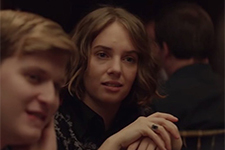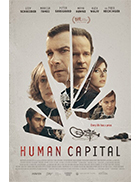Human Capital
|  Marc Meyers’s Human Capital, an adaptation of Stephen Amidon’s 2004 novel that was previously made into a film by Paolo Virzì in 2013, is a familial drama in which the fates of a half-dozen characters become interlocked with the central, binding event being a hit-and-run accident that leaves a waiter who was riding home on his bicycle at death’s door. We see the accident in the film’s opening scene, although we do not find out who was driving the car that hit the cyclist until late in the film. Thus, the question of who was at fault is central to the film’s tension, although Meyers (My Friend Dahmer) and screenwriter Oren Moverman (The Messenger, The Dinner) are clearly more interested in the oscillating interpersonal dynamics among the major characters, who cover a broad range of the socioeconomic spectrum. At the very top of that spectrum is Quint Manning (Peter Sarsgaard), a cocksure millionaire hedge fund manager whose teenage son, Jamie (Fred Hechinger), is dating Shannon (Maya Hawke), the daughter of Drew Hagel (Liev Schreiber), a struggling real estate agent whose much younger wife, Ronnie (Betty Gabriel), is pregnant with twins after several miscarriages. When Drew thinks he hits it off with Quint one morning over a game of tennis, he asks to buy into his hedge fund, which he does not have the financial backing to do. A former gambler who can’t resist passing up an seemingly good opportunity, Drew borrows the $300,000 minimum to invest and then lies on the SEC forms about his net worth, a decision that comes back to haunt him when things turn south. Meanwhile, Quint’s increasingly restless wife, Carrie (Marisa Tomei), finds inspiration in her life by renovating an abandoned theater, the funding for which she needs from her husband, who sees no long-term gain. Her involvement with the theater also brings into her life an awkward professor who wants to be the theater’s artistic director and is clearly romantically interested in Carrie. And, as if that weren’t enough, halfway through the film we are introduced to Ian Warfield (Alex Wolf), a troubled teen nihilist with a skeevy uncle and a questionable background with whom Shannon becomes involved. These characters’ interlocking stories are broken into various temporally asynchronous narrative shards, so that we pick up various arcs at different points and sometimes return to moments in time that we’ve already seen, but from different perspectives. It’s an effective strategy that keeps the film consistently engaging, although you might also get the sense at the end that the chronological jumble creates a sense of mystery and gravitas that the narratives by themselves couldn’t sustain. Meyers is a good director with a strong sense of character, and he is working with a top-notch cast who all turn in solid performances (Schreiber’s existential dread is particularly compelling at its most dire). However, the film’s effectiveness is undermined at various points by some questionable plot developments that strain credulity. For example, Drew and Quint first cross paths after Drew drops Shannon off at the Mannings’ mansion, which is a beautiful, but fundamentally cold modernist architectural wonder. He decides for no explicable reason to simple wander around the Manning property of his own accord, a decision that is rude at best, creepy at worst. But, it offers the opportunity for him to spot Carrie looking forlornly out her floor-to-ceiling bedroom window, thus establishing her abject unhappiness, and for him to be invited by Quint—who has no idea who he is—to invite him to join an ongoing game of tennis. It gets a lot of plot mechanics moving and introduces many characters, but none of it is really believable, and it all takes place in the film’s second scene. The subsequent plot developments feel more natural, and the film works better as a whole once its momentum gathers steam. In the end, though, it’s hard to say what the film is saying about anything other than the dangers created by the characters’ various self-interests. One might be led to think, especially given the economic bent of the film’s title, that it is trying to say something about social class, the commodification of human experience, and what happens when boundaries are crossed, but there really isn’t much difference in the end between Drew’s middle-class desire to get rich and Quint’s upper-class desire to stay rich. The former becomes desperate while the latter reveals his callousness, but Drew ultimately demonstrates that he can be just as callous when it serves his ends. There is a glint of hope at the end that maybe some lessons have been learned, although it’s impossible to say what, which robs the film of what could have been a deeper sense of meaning. Copyright © 2020 James Kendrick Thoughts? E-mail James Kendrick All images copyright © Vertical Entertainment |
Overall Rating: 

 (2.5)
(2.5)


